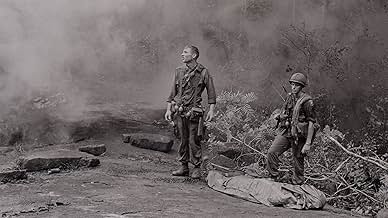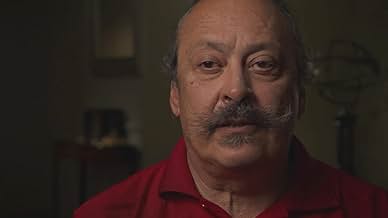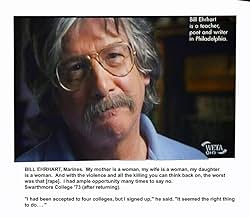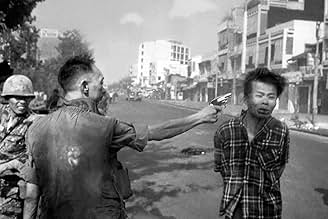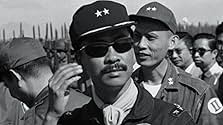Anfang 2017 jährte sich das Ende des Vietnamkriegs (1955-1975) zum 42. Mal. Die Doku-Serie erzählt die Geschichte dieses Krieges so umfassend und detailliert wie nie zuvor.Anfang 2017 jährte sich das Ende des Vietnamkriegs (1955-1975) zum 42. Mal. Die Doku-Serie erzählt die Geschichte dieses Krieges so umfassend und detailliert wie nie zuvor.Anfang 2017 jährte sich das Ende des Vietnamkriegs (1955-1975) zum 42. Mal. Die Doku-Serie erzählt die Geschichte dieses Krieges so umfassend und detailliert wie nie zuvor.
- Für 4 Primetime Emmys nominiert
- 5 Gewinne & 10 Nominierungen insgesamt
Folgen durchsuchen
Handlung
WUSSTEST DU SCHON:
- WissenswertesMany of the combat footage reels shown throughout the series are not from the battle being discussed, for example, during the discussion of Saigon during the Tet Offensive, several videos filmed in the city of Hue are shown as if they are in Saigon.
- VerbindungenFeatured in Ken Burns: America's Storyteller (2017)
Ausgewählte Rezension
Described by the show's official website as "an immersive 360-degree narrative," The Vietnam War is a behemoth in every sense of the word; written by historian Geoffrey C. Ward and directed by celebrated documentarians Ken Burns and Lynn Novick, the series cost $30 million to make, and was in production for over ten years, with the ten episodes running to a gargantuan eighteen hours. Assembled from over 24,000 photos and 1,500 hours of archive footage, the show features interviews with 79 people, including analysts, bureaucrats, journalists, artists, anti-war protestors, draft dodgers, conscientious objectors, deserters, Gold Star family members, and American, South Vietnamese, and North Vietnamese troops. Deliberately eschewing interviews with historians and major polarising figures such as Jane Fonda, John Kerry, or Oliver Stone, the series features what Burns and Novick define as a "ground up" approach; concentrating almost exclusively on the experiences of ordinary people and soldiers from every side.
Telling the story of a conflict, to quote the film itself, "begun in good faith by decent people, out of fateful misunderstandings, and prolonged because it seemed easier to muddle through than admit that it had been caused by tragic decisions," the show begins in reverse; following a brief introduction, scenes of well-known archival footage literally begin to run backwards. It's an unusually stylistic opening for a documentary, especially a multi-part documentary on public television, but there is an important conceptual point in this aesthetic decision; reversing such familiar images works as an opening thematic statement - yes, we all know these pictures, we've all seen them before, but this series is going to show them to us anew.
Beginning with the French invasion of Indochina in 1858 and concluding with the opening of the Vietnam Veterans Memorial in 1982 (although some brief postscript material goes up to President Barak Obama's visit to Vietnam in 2016), the series hits all the beats you'd expect within this timeframe - the rise of Hô Chí Minh and the formation of the Viet Minh; the Korean War; the Battle of Diên Biên Phu, and subsequent French withdrawal from Indochina; the rise of Lê Duan and the formation of the Viet Cong; Thích Quang Duc's self-immolation; the Gulf of Tonkin incident; the Têt Offensive; the Moratorium to End the War in Vietnam; the Kent State shootings; the Pentagon Papers; the Easter Offensive; the Watergate scandal; Nixon's resignation; and the Fall/Liberation of Saigon.
However, where The Vietnam War excels is not in trying to present an all-inclusive encyclopaedic summary of everything that happened in the war, but in its mixture of the macro and the micro - intercut into the larger framework of political analysis and military assessment are more relatable and personalised interviews, which serve to reinforce what the war was like for the people who actually fought it and their families back home. These human stories serve as Burns and Novick's "ground up" material, helping to contextualise the wide-ranging and less personal socio-political canvas against which they are set, never allowing the audience to view the conflict as a statistical abstraction or a dry chronological list of battles. Indeed, in relation to this, one of the most immediately and consistently obvious aspects of the series is its respect for the individual combatants on all sides.
If the micro is the show's heart and soul, however, the macro makes up the bulk of its content, and in this sense, perhaps the central-most theme is how the Kennedy, Johnson, and Nixon administrations each got deeper and deeper into the conflict despite knowing it was a mistake to do so and that the war was either unwinnable, or could only be won with unacceptable losses. Although they continually assured the press and public that things were going well, and the North Vietnamese would soon surrender, behind the scenes all three presidents knew the situation was dire.
A major theme throughout the series is the effect the war had on the American psyche. Whilst the first episode outlines how the US emerged from World War II as world leaders, convinced of its own irrefutable morality and righteousness, proud of its self-appointed role as global law enforcer, the later episodes detail, often through the personal experiences of returning Vets, how all of this changed during the war. Fought in a country few Americans had even heard of, and fewer still knew anything about, the war was a conflict whose ultimate futility at so great a cost was unlike anything any living American had seen. The stain of the war lingered for decades, and lingers still. As the documentary lays bare, Vietnam fundamentally redefined the notion of American patriotism, altered the constitution of the American zeitgeist, and undermined the concept of American exceptionalism, which was so vital a component of how the US conducted itself on the international stage.
Another vital theme, but one which remains unsaid, left for the viewer to provide the connective tissue, is how the domestic events of the war are mirrored in contemporary American society. For example, as the government continued to insist that things were going well, journalists began to report a very different story, leading to the rise of the "credibility gap" - the disparity between the claims made by the government in regards to a situation, and the actual facts of that situation. It doesn't take a genius to see the relevance here - the credibility gap is a direct progenitor of "fake news" and, even more directly, "alternative facts", both of which are specifically associated with the Trump administration. Although Burns and Novick ensure the viewer understands the empirical message that the war destroyed lives and minds, and eviscerated the trust the American people had for their government, they never explicitly state that the socio-political fabric of the 60s and 70s finds echoes in the present day. However, evidence of such is seen time and again throughout the documentary.
Undoubtedly, the war was the most divisive period in the US since the Civil War. However, the most divisive period since the war is right now; the US is currently in the seventeenth year of a war begun under dubious circumstances; there are accusations of foreign collusion in a US election; the president has threatened to use force against an Asian nation; there are mass demonstrations across the country; the White House is obsessed with leaks; Johnson and Nixon's attempts to undermine the media, and Nixon's attempts to delegitimise any and all opposition are echoed in Trump's unfounded accusations that the Democrats, for example, paid Dr. Christine Blasey Ford to testify against Brett Kavanaugh, and falsely inflated the death toll in Puerto Rico in the wake of Hurricane Florence.
From an aesthetic point of view, one of the most impressive aspects of the documentary is the soundscape. The soundtrack features songs from over 120 contemporary artists. Some of the songs are a little too obvious, but the score more than makes up for that, with the harsh metallic sounds of Trent Reznor and Atticus Ross, contrasting with the Vietnamese folk songs performed by Yo-Yo Ma and the Silk Road Ensemble. Also worth mentioning is something that rarely stands out in a documentary - the foley. Listening to the series on a good sound system, the whirls of rotor blades rise from the surround speakers, the effects of napalm suck the sound into the TV before blasting it back out, bullets whizz past the viewer's head, far off artillery rumbles deeply in the subwoofer. It really is an immersive experience, as impressive as any big-budget film.
However, the series is not perfect. Easily the most obvious criticism is that despite their claims that all sides are represented equally, there is a real imbalance between the anti-war movement (represented by three interviewees and dozens of Vets), and those who supported the war (represented by a few comments here and there from people who admit they were conflicted). This imbalance is also present, although less conspicuous, in the number of North Vietnamese combatants (14) weighed against the number of South Vietnamese combatants (7).
There are also some notable, and oftentimes bizarre, omissions. For example, there is no mention whatsoever of Maj Gen Edward Lansdale, who was pivotal in Ngô Dình Diem's victory in the rigged 1955 presidential election, and who famously stated, "there is only one means of defeating an insurgent people who will not surrender, and that is extermination." Likewise, there are no references to LTC John Paul Vann who was publicly critical of how the US was conducting the war, at a time when the vast majority of Americans and most of the press were happy with how things were going. Also absent is Lê Van Vien (aka Bay Vien), commander of the Bình Xuyên, an autonomous criminal organisation within the Vietnamese National Army during the years of French occupation
Nevertheless, The Vietnam War is an undeniably epic achievement. Burns and Novick have distilled down a massively complex canvas of competing ideologies, whilst at the same time refusing to placate either side. This refusal leaves the series open to criticism from both sides, but it may also be the show's greatest strength. Rather than submitting to partisan politics, the series follows its own path, irrespective of how it appears to those with preconceived notions. As harrowing as it is insightful, as informative as it is disturbing, conciliatory rather than condemnatory, The Vietnam War is a masterpiece, and surely one of the finest documentaries ever made.
Telling the story of a conflict, to quote the film itself, "begun in good faith by decent people, out of fateful misunderstandings, and prolonged because it seemed easier to muddle through than admit that it had been caused by tragic decisions," the show begins in reverse; following a brief introduction, scenes of well-known archival footage literally begin to run backwards. It's an unusually stylistic opening for a documentary, especially a multi-part documentary on public television, but there is an important conceptual point in this aesthetic decision; reversing such familiar images works as an opening thematic statement - yes, we all know these pictures, we've all seen them before, but this series is going to show them to us anew.
Beginning with the French invasion of Indochina in 1858 and concluding with the opening of the Vietnam Veterans Memorial in 1982 (although some brief postscript material goes up to President Barak Obama's visit to Vietnam in 2016), the series hits all the beats you'd expect within this timeframe - the rise of Hô Chí Minh and the formation of the Viet Minh; the Korean War; the Battle of Diên Biên Phu, and subsequent French withdrawal from Indochina; the rise of Lê Duan and the formation of the Viet Cong; Thích Quang Duc's self-immolation; the Gulf of Tonkin incident; the Têt Offensive; the Moratorium to End the War in Vietnam; the Kent State shootings; the Pentagon Papers; the Easter Offensive; the Watergate scandal; Nixon's resignation; and the Fall/Liberation of Saigon.
However, where The Vietnam War excels is not in trying to present an all-inclusive encyclopaedic summary of everything that happened in the war, but in its mixture of the macro and the micro - intercut into the larger framework of political analysis and military assessment are more relatable and personalised interviews, which serve to reinforce what the war was like for the people who actually fought it and their families back home. These human stories serve as Burns and Novick's "ground up" material, helping to contextualise the wide-ranging and less personal socio-political canvas against which they are set, never allowing the audience to view the conflict as a statistical abstraction or a dry chronological list of battles. Indeed, in relation to this, one of the most immediately and consistently obvious aspects of the series is its respect for the individual combatants on all sides.
If the micro is the show's heart and soul, however, the macro makes up the bulk of its content, and in this sense, perhaps the central-most theme is how the Kennedy, Johnson, and Nixon administrations each got deeper and deeper into the conflict despite knowing it was a mistake to do so and that the war was either unwinnable, or could only be won with unacceptable losses. Although they continually assured the press and public that things were going well, and the North Vietnamese would soon surrender, behind the scenes all three presidents knew the situation was dire.
A major theme throughout the series is the effect the war had on the American psyche. Whilst the first episode outlines how the US emerged from World War II as world leaders, convinced of its own irrefutable morality and righteousness, proud of its self-appointed role as global law enforcer, the later episodes detail, often through the personal experiences of returning Vets, how all of this changed during the war. Fought in a country few Americans had even heard of, and fewer still knew anything about, the war was a conflict whose ultimate futility at so great a cost was unlike anything any living American had seen. The stain of the war lingered for decades, and lingers still. As the documentary lays bare, Vietnam fundamentally redefined the notion of American patriotism, altered the constitution of the American zeitgeist, and undermined the concept of American exceptionalism, which was so vital a component of how the US conducted itself on the international stage.
Another vital theme, but one which remains unsaid, left for the viewer to provide the connective tissue, is how the domestic events of the war are mirrored in contemporary American society. For example, as the government continued to insist that things were going well, journalists began to report a very different story, leading to the rise of the "credibility gap" - the disparity between the claims made by the government in regards to a situation, and the actual facts of that situation. It doesn't take a genius to see the relevance here - the credibility gap is a direct progenitor of "fake news" and, even more directly, "alternative facts", both of which are specifically associated with the Trump administration. Although Burns and Novick ensure the viewer understands the empirical message that the war destroyed lives and minds, and eviscerated the trust the American people had for their government, they never explicitly state that the socio-political fabric of the 60s and 70s finds echoes in the present day. However, evidence of such is seen time and again throughout the documentary.
Undoubtedly, the war was the most divisive period in the US since the Civil War. However, the most divisive period since the war is right now; the US is currently in the seventeenth year of a war begun under dubious circumstances; there are accusations of foreign collusion in a US election; the president has threatened to use force against an Asian nation; there are mass demonstrations across the country; the White House is obsessed with leaks; Johnson and Nixon's attempts to undermine the media, and Nixon's attempts to delegitimise any and all opposition are echoed in Trump's unfounded accusations that the Democrats, for example, paid Dr. Christine Blasey Ford to testify against Brett Kavanaugh, and falsely inflated the death toll in Puerto Rico in the wake of Hurricane Florence.
From an aesthetic point of view, one of the most impressive aspects of the documentary is the soundscape. The soundtrack features songs from over 120 contemporary artists. Some of the songs are a little too obvious, but the score more than makes up for that, with the harsh metallic sounds of Trent Reznor and Atticus Ross, contrasting with the Vietnamese folk songs performed by Yo-Yo Ma and the Silk Road Ensemble. Also worth mentioning is something that rarely stands out in a documentary - the foley. Listening to the series on a good sound system, the whirls of rotor blades rise from the surround speakers, the effects of napalm suck the sound into the TV before blasting it back out, bullets whizz past the viewer's head, far off artillery rumbles deeply in the subwoofer. It really is an immersive experience, as impressive as any big-budget film.
However, the series is not perfect. Easily the most obvious criticism is that despite their claims that all sides are represented equally, there is a real imbalance between the anti-war movement (represented by three interviewees and dozens of Vets), and those who supported the war (represented by a few comments here and there from people who admit they were conflicted). This imbalance is also present, although less conspicuous, in the number of North Vietnamese combatants (14) weighed against the number of South Vietnamese combatants (7).
There are also some notable, and oftentimes bizarre, omissions. For example, there is no mention whatsoever of Maj Gen Edward Lansdale, who was pivotal in Ngô Dình Diem's victory in the rigged 1955 presidential election, and who famously stated, "there is only one means of defeating an insurgent people who will not surrender, and that is extermination." Likewise, there are no references to LTC John Paul Vann who was publicly critical of how the US was conducting the war, at a time when the vast majority of Americans and most of the press were happy with how things were going. Also absent is Lê Van Vien (aka Bay Vien), commander of the Bình Xuyên, an autonomous criminal organisation within the Vietnamese National Army during the years of French occupation
Nevertheless, The Vietnam War is an undeniably epic achievement. Burns and Novick have distilled down a massively complex canvas of competing ideologies, whilst at the same time refusing to placate either side. This refusal leaves the series open to criticism from both sides, but it may also be the show's greatest strength. Rather than submitting to partisan politics, the series follows its own path, irrespective of how it appears to those with preconceived notions. As harrowing as it is insightful, as informative as it is disturbing, conciliatory rather than condemnatory, The Vietnam War is a masterpiece, and surely one of the finest documentaries ever made.
Top-Auswahl
Melde dich zum Bewerten an und greife auf die Watchlist für personalisierte Empfehlungen zu.
- How many seasons does The Vietnam War have?Powered by Alexa
Details
- Erscheinungsdatum
- Herkunftsländer
- Offizielle Standorte
- Sprachen
- Auch bekannt als
- The Vietnam War
- Produktionsfirmen
- Weitere beteiligte Unternehmen bei IMDbPro anzeigen
- Laufzeit1 Stunde 30 Minuten
- Farbe
- Seitenverhältnis
- 16:9 HD
Zu dieser Seite beitragen
Bearbeitung vorschlagen oder fehlenden Inhalt hinzufügen



